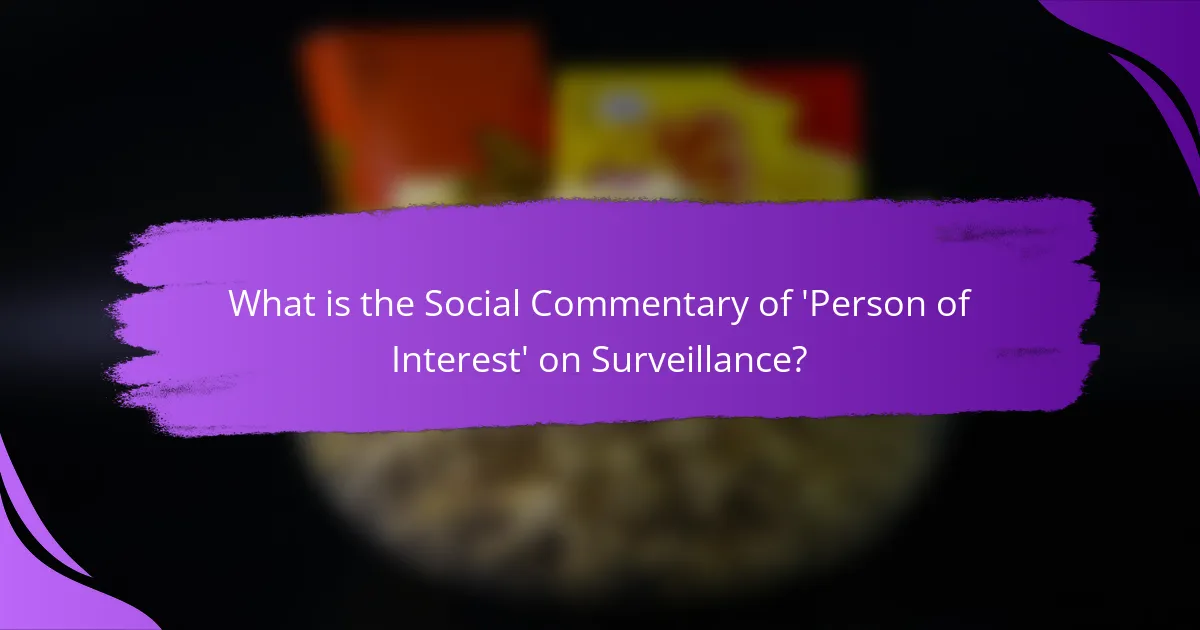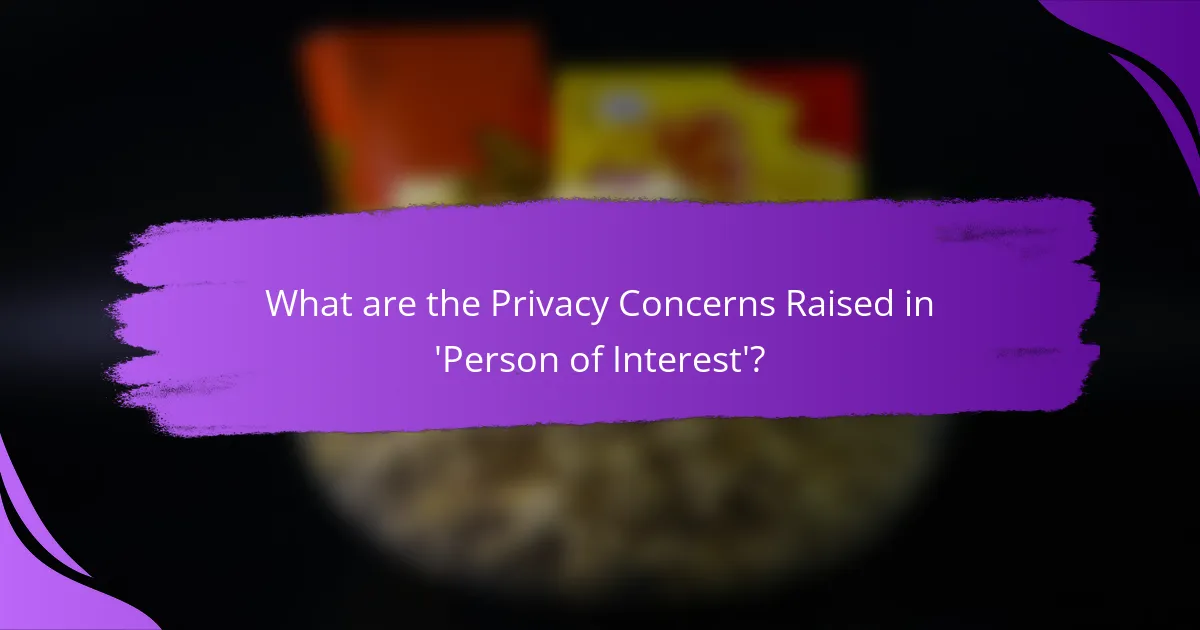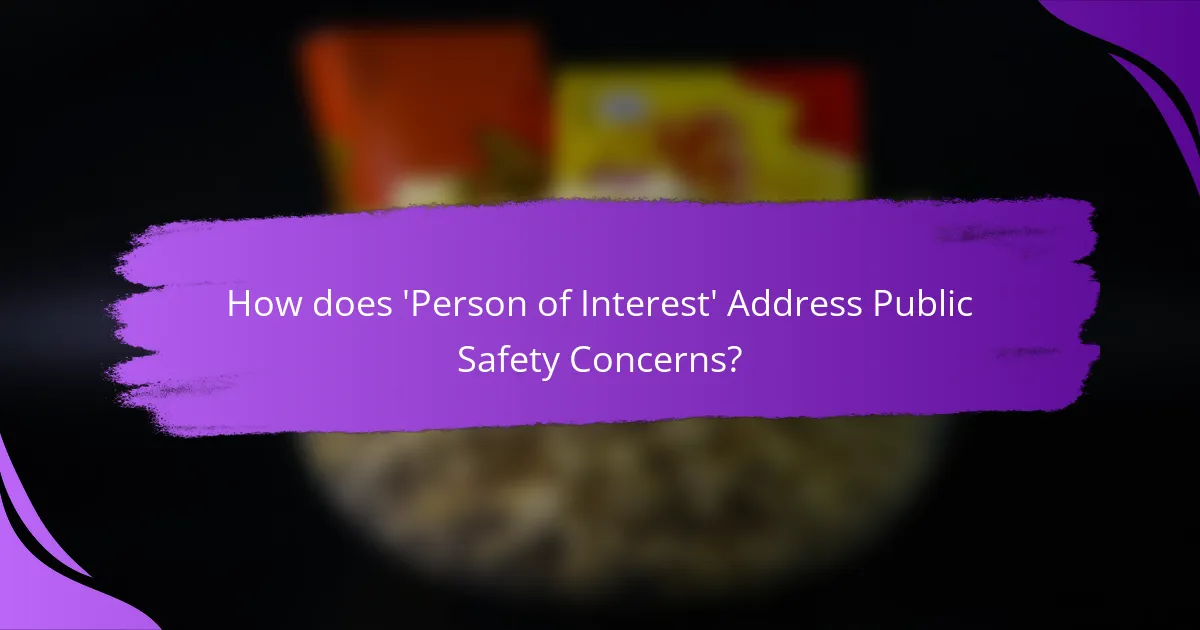‘Person of Interest’ is a television series that critiques the implications of surveillance technology on personal privacy and public safety. The narrative explores the dual nature of advanced surveillance systems, highlighting how they can both protect society and infringe on individual rights. Key themes include the ethical dilemmas surrounding preemptive policing, government and corporate misuse of data, and the moral challenges faced by characters like Harold Finch, who embodies the conflict between security and freedom. The show raises significant concerns about the potential for abuse in a data-driven world, emphasizing the need for accountability in the use of surveillance technologies. Overall, it serves as a cautionary tale regarding the reliance on surveillance for ensuring safety.

What is the Social Commentary of ‘Person of Interest’ on Surveillance?
‘Person of Interest’ critiques surveillance as a double-edged sword. It highlights how technology can protect society but also infringe on personal privacy. The show portrays government and corporate misuse of surveillance for control. It raises ethical questions about the balance between security and freedom. The character of Harold Finch embodies the moral dilemmas of creating a surveillance system. He struggles with the implications of monitoring individuals without consent. The narrative emphasizes the potential for abuse in a data-driven world. Overall, the series serves as a cautionary tale about unchecked surveillance.
How does ‘Person of Interest’ portray the concept of surveillance?
‘Person of Interest’ portrays the concept of surveillance as a pervasive and omnipresent tool for monitoring individuals. The series illustrates how technology enables constant observation of people’s actions and interactions. It highlights the ethical dilemmas surrounding privacy and security. The character Harold Finch creates a sophisticated surveillance system known as “The Machine.” This system predicts violent crimes by analyzing vast amounts of data. The show raises questions about government oversight and individual freedoms. It depicts surveillance as both a protective measure and a potential violation of personal privacy. Through its narrative, ‘Person of Interest’ critiques the balance between public safety and civil liberties.
What are the key elements of surveillance depicted in the series?
The key elements of surveillance depicted in the series include data collection, monitoring, and predictive analysis. Data collection occurs through various means, such as cameras, phone tapping, and internet activity. Monitoring involves real-time observation of individuals and their activities. Predictive analysis is used to anticipate potential threats based on collected data. The series illustrates how these elements can lead to both public safety and privacy concerns. For instance, the character Harold Finch creates a system that analyzes data to prevent crimes before they happen. This reflects real-world debates about the balance between security and individual privacy rights.
How does the show’s narrative reflect real-world surveillance practices?
The show’s narrative reflects real-world surveillance practices by depicting advanced monitoring technologies used by government agencies. It illustrates how data collection and analysis are utilized to predict criminal activities. The character Harold Finch creates an artificial intelligence that processes vast amounts of information. This mirrors real-life surveillance systems like those employed by law enforcement. The show raises ethical questions about privacy and civil liberties, highlighting potential abuses of power. Real-world examples include the use of algorithms to analyze social media and phone records. Such practices can lead to profiling and unwarranted surveillance of individuals. Overall, the narrative serves as a cautionary tale about the implications of unchecked surveillance.
Why is surveillance a central theme in ‘Person of Interest’?
Surveillance is a central theme in ‘Person of Interest’ because it explores the implications of monitoring and data collection on society. The show presents a world where an artificial intelligence system predicts violent crimes before they occur. This premise raises questions about privacy, ethics, and the balance between security and individual rights.
In ‘Person of Interest’, characters grapple with the consequences of surveillance on personal lives. The narrative illustrates how constant monitoring can lead to both protection and oppression. The show critiques the normalization of surveillance in contemporary society. It reflects real-world concerns about governmental overreach and the erosion of civil liberties.
The portrayal of surveillance in the series serves as a cautionary tale. It highlights the potential dangers of unchecked technological power. The show’s storyline resonates with ongoing debates about the role of surveillance in public safety.
What societal issues does the show address through its surveillance theme?
The show addresses societal issues such as privacy invasion, government surveillance, and ethical implications of technology. It highlights the tension between security and individual rights. The narrative explores how surveillance can lead to a loss of personal freedom. It also raises questions about the morality of preemptive actions based on data. The characters navigate dilemmas stemming from their surveillance practices. This reflects real-world concerns about data collection by governments and corporations. The show illustrates the potential for abuse of power in surveillance systems. It emphasizes the need for accountability and transparency in monitoring practices.
How does the series challenge viewers’ perceptions of privacy?
The series challenges viewers’ perceptions of privacy by depicting a world where surveillance is pervasive. It illustrates how technology can intrude into personal lives without consent. Characters often struggle with the implications of being constantly monitored. The narrative forces viewers to confront the balance between safety and individual privacy. For example, the use of a powerful AI to predict crimes raises ethical questions. This scenario highlights the potential for misuse of surveillance technology. The series also portrays the consequences of losing privacy, such as loss of autonomy and freedom. Overall, it prompts viewers to reconsider their own relationship with privacy in a digital age.

What are the Privacy Concerns Raised in ‘Person of Interest’?
‘Person of Interest’ raises significant privacy concerns regarding surveillance and data collection. The show portrays a world where an advanced AI monitors citizens’ activities. This constant surveillance leads to ethical dilemmas about personal privacy. The implications of preemptive policing are also explored, questioning the balance between security and individual rights. The characters grapple with the consequences of invasive technology on personal freedom. Additionally, the series highlights the risks of misusing data for profiling individuals. Overall, it critiques the potential for government overreach in the name of public safety.
How does the show illustrate the impact of surveillance on individual privacy?
The show “Person of Interest” illustrates the impact of surveillance on individual privacy by depicting a society where constant monitoring is the norm. Characters frequently navigate a world where their actions are scrutinized by advanced technology. This pervasive surveillance leads to a loss of personal autonomy and freedom. The show highlights the ethical dilemmas associated with sacrificing privacy for security. For example, the Machine, an artificial intelligence, analyzes vast amounts of data to predict crimes before they occur. This predictive capability raises questions about the accuracy and morality of such interventions. The characters often face dilemmas where their private lives are exposed without consent. This portrayal serves as a commentary on real-world surveillance practices and their implications for civil liberties. Overall, the show effectively critiques the balance between safety and privacy in a surveillance-heavy society.
What specific scenarios in the series highlight privacy violations?
The series “Person of Interest” highlights several scenarios that illustrate privacy violations. One scenario involves the use of the Machine to surveil individuals without their consent. The characters often access private communications and personal data, showcasing a lack of privacy. Another scenario features government agencies monitoring citizens’ movements through surveillance cameras. This demonstrates the invasive nature of state surveillance. Additionally, the show depicts hacking into personal devices, further violating individual privacy. These examples emphasize the ethical dilemmas surrounding surveillance technology and its impact on personal freedoms.
How do characters in the show respond to privacy invasions?
Characters in the show respond to privacy invasions with a mix of resistance and acceptance. Some characters actively fight against surveillance, expressing anger and frustration. They often take measures to protect their personal information. Other characters, however, show a resigned attitude, believing privacy is a lost cause in a surveillance-heavy society. This duality reflects real-world debates on privacy and security. For instance, the character Harold Finch emphasizes the importance of protecting individual rights. In contrast, government agents prioritize public safety over personal privacy. These responses highlight the tension between privacy rights and societal security needs.
What ethical questions about privacy does ‘Person of Interest’ raise?
‘Person of Interest’ raises significant ethical questions about privacy, particularly concerning surveillance and data collection. The show explores the implications of a powerful artificial intelligence that predicts crimes before they occur. This raises concerns about the potential for abuse of surveillance technologies by governments or corporations.
The ethical dilemma centers on the balance between public safety and individual privacy rights. Viewers question if preemptive actions based on predictions infringe on civil liberties. The series also highlights the moral responsibility of those who control such technology.
As the narrative unfolds, it prompts discussions about consent and the transparency of surveillance practices. The characters’ struggles illustrate the consequences of living in a society where privacy is compromised for perceived security. Overall, ‘Person of Interest’ serves as a cautionary tale about the dangers of unchecked surveillance and its impact on personal freedoms.
How does the show depict the balance between security and privacy?
The show “Person of Interest” depicts the balance between security and privacy as a complex and often contentious issue. It illustrates that security measures can infringe on personal privacy. The characters frequently face dilemmas where protecting the public requires surveillance that compromises individual rights. For instance, the use of advanced technology to predict crimes raises ethical questions about consent and oversight. The narrative suggests that while security is essential for public safety, it should not come at the cost of civil liberties. This duality is emphasized through character interactions and plot developments that highlight the consequences of prioritizing one over the other. The show ultimately prompts viewers to consider the implications of surveillance on society and the need for a balanced approach.
What lessons can viewers learn about privacy from the series?
Viewers can learn that privacy is often compromised in the name of security. The series illustrates how surveillance technology can infringe on individual rights. It highlights the tension between public safety and personal privacy. The characters face ethical dilemmas regarding data collection and its implications. Viewers see the consequences of a surveillance state on society. The series emphasizes the importance of being aware of how personal information is used. It encourages critical thinking about the balance between safety and privacy. Ultimately, the series serves as a cautionary tale about unchecked surveillance.

How does ‘Person of Interest’ Address Public Safety Concerns?
‘Person of Interest’ addresses public safety concerns through its portrayal of a surveillance system designed to predict violent crimes. The show illustrates the tension between security and individual privacy. It raises questions about the ethical implications of preemptive action based on data analysis. Characters often grapple with the consequences of acting on information from the Machine, the AI that identifies threats. The narrative demonstrates that while the system aims to protect citizens, it can lead to moral dilemmas. The series highlights instances where innocent individuals are caught in the crossfire of surveillance. It emphasizes the importance of accountability in using such technology for public safety. Overall, ‘Person of Interest’ critiques the reliance on surveillance as a means to ensure security.
In what ways does the show connect surveillance with public safety?
The show “Person of Interest” connects surveillance with public safety by depicting a system that predicts violent crimes. The character Harold Finch develops an advanced AI to analyze data from surveillance cameras and social networks. This AI identifies potential threats before they occur, aiming to prevent harm to individuals. The series illustrates the tension between privacy rights and the need for security. It raises questions about the ethical implications of surveillance for public safety. The narrative shows how surveillance can be a double-edged sword, offering protection while also risking personal freedoms. Through various story arcs, the show highlights real-world concerns regarding state surveillance and its impact on society.
What examples from the series show the benefits of surveillance for public safety?
The series ‘Person of Interest’ illustrates several benefits of surveillance for public safety. One example is the use of the Machine, an AI that analyzes vast amounts of data to predict violent crimes. This predictive capability allows law enforcement to intervene before crimes occur, potentially saving lives. Another instance is the monitoring of public spaces through security cameras, which helps in identifying and apprehending suspects in real-time. The character Harold Finch often emphasizes the importance of preventing harm to innocent people through surveillance. Additionally, the series depicts how data analysis can uncover patterns in criminal behavior, leading to more effective policing strategies. These examples highlight the positive impact of surveillance in enhancing public safety.
How do characters justify surveillance in the name of safety?
Characters in ‘Person of Interest’ justify surveillance in the name of safety by arguing that it prevents crime and protects citizens. They believe that monitoring potential threats allows for timely intervention. This rationale is often framed within the context of national security and public safety. The characters emphasize the importance of safeguarding society from harm. They often reference statistics showing reduced crime rates due to proactive surveillance measures. Additionally, they argue that the benefits of surveillance outweigh privacy concerns. By presenting surveillance as a necessary tool, they seek to normalize its use in everyday life. This perspective reflects broader societal debates about the balance between security and privacy.
What criticisms does ‘Person of Interest’ make regarding public safety measures?
‘Person of Interest’ critiques public safety measures by highlighting the dangers of excessive surveillance. The show portrays a society where safety is prioritized over individual privacy. It suggests that reliance on technology can lead to ethical dilemmas. The series illustrates how data collection can infringe on civil liberties. Characters often face moral conflicts regarding the use of surveillance for protection. The narrative questions the effectiveness of predictive policing methods. It raises concerns about the potential for abuse of power by authorities. Overall, the show emphasizes the need for a balance between safety and privacy rights.
How does the series portray the consequences of excessive surveillance on society?
The series “Person of Interest” portrays excessive surveillance as detrimental to societal trust and individual privacy. It illustrates how constant monitoring leads to paranoia among citizens. The show depicts characters who struggle with the loss of anonymity in their daily lives. Surveillance is shown to create a chilling effect on free expression and dissent. It raises ethical questions about the balance between security and civil liberties. The narrative highlights the potential for abuse of power by those in control of surveillance systems. It emphasizes that excessive surveillance can lead to a society where fear overrides personal freedom. The series ultimately critiques the normalization of invasive technologies in everyday life.
What alternative approaches to public safety does the show suggest?
The show “Person of Interest” suggests alternative approaches to public safety that emphasize proactive intervention and community involvement. It advocates for the use of predictive analytics to prevent crime before it occurs. The narrative highlights the importance of ethical considerations in surveillance practices. It also promotes the idea of empowering individuals and communities to take responsibility for their safety. The show critiques traditional law enforcement methods, proposing that technology should enhance human judgment rather than replace it. This perspective is supported by the portrayal of characters who challenge the status quo and seek to protect the vulnerable. The series ultimately raises questions about the balance between security and personal privacy.
What practical insights can we gain from ‘Person of Interest’ regarding surveillance and privacy?
‘Person of Interest’ offers critical insights into the implications of surveillance on privacy. The show illustrates how advanced surveillance technologies can predict crimes before they occur. This raises ethical questions about the balance between public safety and individual privacy rights. The narrative highlights the potential misuse of surveillance data by authorities. It also demonstrates the consequences of pervasive monitoring on personal freedoms. The characters often grapple with the moral dilemmas associated with their surveillance activities. The series prompts viewers to consider the trade-offs between security and civil liberties. Overall, it serves as a cautionary tale about the unchecked power of surveillance systems.
The main entity of this article is the television series ‘Person of Interest’, which critiques the implications of surveillance on privacy and public safety. The article examines how the show portrays surveillance as a dual-edged tool that can protect society while simultaneously infringing on personal freedoms. Key discussions include the ethical dilemmas faced by characters regarding data collection and monitoring, the balance between security and individual rights, and the societal consequences of excessive surveillance. Additionally, the article highlights the potential for government overreach and the need for accountability in surveillance practices. Overall, it serves as a cautionary commentary on the intersection of technology, privacy, and civil liberties.